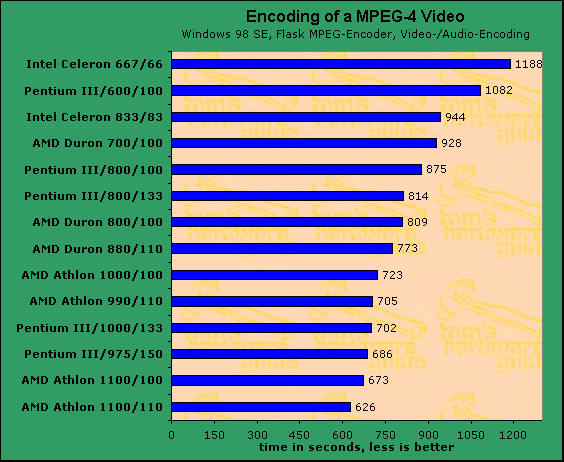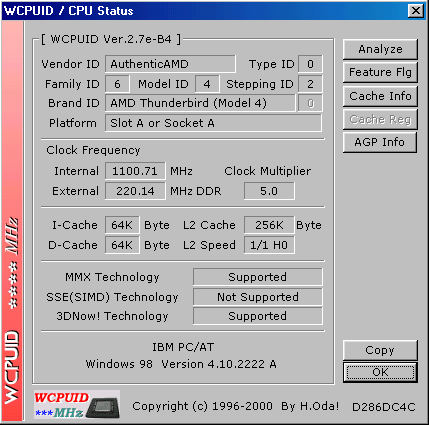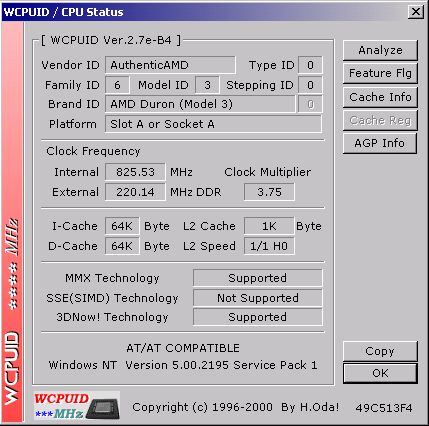AMD vs. Intel: The best CPU for MPEG-4.
Get Tom's Hardware's best news and in-depth reviews, straight to your inbox.
You are now subscribed
Your newsletter sign-up was successful
AMD Duron Beats Intel Pentium III
This diagram makes it clear: the MPEG-4 encoding speed strongly depends on the clock rates of the processor and the front-side bus.
We used two test platforms for the creation of an MPEG-4 video: the first was a socket 370 system for Intel's Pentium III and Celeron, the other test system was a socket 462 (socket A) system for AMD's Athlon and Duron processors. Apart from the processors, both systems were equipped with identical hardware and software. The Flask Mpeg Encoder software was used to convert an MPEG-2 video into MPEG-4 format (also used in our last test). The test sequence was a four minute film trailer which contained an AC3 audio stream amongst other things.
The diagram above shows the time required by the individual processors to encode the video into MPEG-4 format. At first glance the following facts are obvious: the higher the clock rate of a CPU, the faster the MPEG-4 encoding stream. Whereas the Celeron 667 needed almost 20 minutes to encode the four minute film sequence (1,188 seconds), AMD's Athlon 1100 MHz processor completed the same job in approximately 10 minutes (626 seconds). Also quite interesting: AMD's value-for-money processor, Duron beat the much more expensive Intel Pentium III!
The fastest CPU for MPEG-4 video encoding is AMD's Athlon 1100. The diagram shows an overclocked processor with a 110 MHz front-side bus.
The duel between the fastest currently available processors - Intel's Pentium III/1000 and AMD's Athlon 1000 - is virtually a dead heat: the Intel CPU actually required 20 seconds less than its AMD competitor to encode the film into MPEG-4 format, but it had a front-side bus clock rate of 133 MHz. AMD's Athlon however, was only clocked at 100 MHz although it uses Double Data Rate technology. A multitude of marketing strategists on AMD's side therefore prefer to refer to this front-side bus technology as a 200 MHz system.
The CPU with the best price/performance ratio when concerned with MPEG-4 video encoding: AMD's Duron 650 can be overclocked to 825 MHz with a corresponding motherboard and then beats Intel's Pentium III/800.
CPU For MPEG-4: Clock Rate, FSB And L2 Cache
At this point we can definitely say that the creation of an MPEG-4 sequence demands incredible CPU performance. The encoding speed is principally dependant on the CPU clock rate. Furthermore, the front-side bus or memory clock rate plays an important role. The results of Intel's Celeron with a FSB clocked at 66 MHz make this very clear as it yielded the worst conversion performance. The results of Intel's Pentium III/1000 prove that a front-side bus overclocked to 150 MHz has notable effects on the MPEG performance. The processor attained much better results at 975/150 MHz than the standard version.
Get Tom's Hardware's best news and in-depth reviews, straight to your inbox.
Furthermore, our tests lead us to assume that the architecture of the AMD processors is better-suited to MPEG-4 encoding. The results of the overclocked Duron indicate this as it was only operating with a 100 MHz FSB but still outclassed the Pentium III with a 133 MHz FSB.
An ISSE version of the Flask Mpeg program would be interesting in order to investigate the streaming support propagated by Intel. The MPEG software currently only supports MMX instructions so that both AMD and Intel processors profit from this. The benchmark results also show quite clearly that the size of the L2 cache, which is integrated in the CPU core of all the processors, has a marked effect on the performance of the devices during MPEG encoding. Both AMD's Duron and Intel's Celeron have a smaller L2 cache and are therefore not in the leading group.
This is what an MPEG-4 video sequence looks like after it has been converted from the MPEG-2 format from a DVD-ROM. This video has a data rate of 150 kb per second at a resolution of 720 x 576 pixels with stereo sound (48 kHz).
Current page: AMD Duron Beats Intel Pentium III
Prev Page Hard Labor - The Best CPU For MPEG-4 Next Page CPU Load During MPEG-4 Playback


